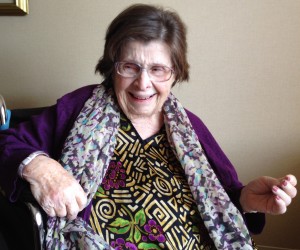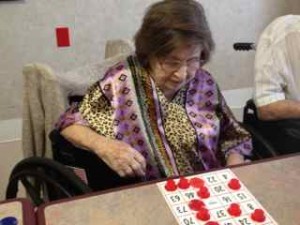
by Diane Masson | Jun 1, 2014
 Yesterday, I learned of a senior resident in California who was denied HER long-term care coverage in skilled nursing, because she had missed one payment while ill. Are you seriously kidding me? This is flat out wrong and it makes me angry. I have been in the senior living industry for fifteen years and always considered those with long-term insurance fortunate.
Yesterday, I learned of a senior resident in California who was denied HER long-term care coverage in skilled nursing, because she had missed one payment while ill. Are you seriously kidding me? This is flat out wrong and it makes me angry. I have been in the senior living industry for fifteen years and always considered those with long-term insurance fortunate.
Now I realize that when a senior is most vulnerable is also when they need this coverage to kick in. Who will fill out the paperwork? All the Continuing Care Retirement Communities where I work graciously accommodate residents in this area. But what about missing a payment to the long term care insurance company? This seems bound to happen.
According the Alzheimer’s Association one in three seniors die of dementia, so it would make sense that a senior with dementia or Alzheimer’s might miss a bill or two. So all those years of paying in for a higher level of care are negated when you are sick and demented? Come on, this is not acceptable.
Long-term care insurance is a security blanket to offset the high cost of future health care as you age. Many seniors have paid in for years to either have a policy that provides up to a certain dollar amount or certain time range (typically three years).
The senior and her family are all panicked. The son made numerous attempts to call his mom’s insurance company and would remain on hold for over forty minutes. Unbelievably, after he finally reached them thirty days later, the policy had expired two days before for lack of payment. If someone has been paying for long-term care insurance for years, you should not be penalized when you are sick and need the care the most. The family is appealing.
Has anyone else heard of this happening? Is this normal? Do you think it is okay?
Please consider joining this exclusive Marketing2Seniors blog and comment below to join the conversation and interact with other senior living professionals on what is currently being effective to increase occupancy on a nationwide basis.
Diane Twohy Masson is currently writing a new book for seniors on how to select senior housing options. Her first book, “Senior Housing Marketing – How to Increase Your Occupancy and Stay Full,” is available at Amazon.com with a five star rating. Masson continues to set move in records as the regional marketing director of two debt-free Continuing Care Retirement Communities in Southern California – Freedom Village in Lake Forest and The Village in Hemet, California. Her mom’s struggle with dementia is inspiring Diane to pen a third book to support adult children.
© Marketing 2 Seniors| Diane Twohy Masson 2014 All Rights Reserved. No part of this blog post may be reproduced, copied, modified or adapted, without the prior written consent of the author, unless otherwise indicated for stand-alone materials. You may share this website and or it’s content by any of the following means: 1. Using any of the share icons at the bottom of each page. 2. Providing a back-link or the URL of the content you wish to disseminate. 3. You may quote extracts from the website with attribution to Diane Masson CASP and link https://www.marketing2seniors.net For any other mode of sharing, please contact the author Diane Masson.

by Diane Masson | Apr 6, 2014
 There was an overwhelming response of ideas and tactics through Linked In of “How To Move Someone Saying, “No!” (Part 1).
There was an overwhelming response of ideas and tactics through Linked In of “How To Move Someone Saying, “No!” (Part 1).
Many people felt that you should never force a senior parent to move. Once the conversation specified parents with dementia, then everyone was onboard with possible solutions. Let me sum up the best strategies and “schemes” on how to move someone who is at risk and seems chained to their current home.
- Move your parent directly from a hospital crisis to a senior living community.
- Be ready to transition your parent to an assisted living community when the rehabilitation is over.
- Say, “As soon as you are better, I will move you back to your home.”
- The primary care physician can convince mom or dad that it is time to move and list the reasons why. (This generation is programed to abide by the doctor’s recommendations.)
- Bring a contractor by your parent’s home and say, “We need to work on the house and the plumbing will be shut down for two weeks. You are only going to move temporarily while the house gets worked on…”
- Sample stays of two to seven nights – to test-drive a retirement community.
- Show them where you want them to move and compare with an awful place they dislike.
- Send them to an adult day program for several weeks before moving them in full time.
- Sometimes you just need to push them to the next step when your parent’s health dictates it.
- The safety of your parent means switching the child/parent roles. You the Boomer child becomes the parent and makes the decision.
- Cajoling: Asking for the GIFT of peace-of-mind from worrying about them.
- Cultivating a move can take months. Include as many lunches and residents activities as possible at a prospective senior living community.
FYI – If a retirement community knows that you are struggling they will triple their efforts to help you and support your parent(s) integration into their community.
Remember that 95% of cognitive seniors who move all say, “I wish that I had moved sooner.” Once they start thriving they won’t want to move back to their isolated home. Patience and empathy are two necessary ingredients that must be present for your parent’s transition.
Any more ideas?
Please share your successes, failures or comment below to join the conversation and interact with other senior living professionals on what is currently being effective to increase occupancy on a nationwide basis.
Diane Twohy Masson is the author of “Senior Housing Marketing – How to Increase Your Occupancy and Stay Full,” available at Amazon.com with a 5-star rating. The book is required reading at George Mason University as a part of its marketing curriculum. Within this book, the author developed a sales & marketing method with 12 keys to help senior living providers increase their occupancy. Masson developed this expertise as a marketing consultant, sought-after blogger for senior housing and a regional marketing director of continuing care retirement communities in several markets. She has also been a corporate director of sales and a mystery shopper for independent living, assisted living, memory care and skilled care nursing communities in multiple states. Currently, Masson is setting move-in records as the regional marketing director of two debt-free Continuing Care Retirement Communities in Southern California – Freedom Village in Lake Forest and The Village in Hemet, California. Interestingly, this career started when she was looking for a place for her own mom and helped her loved one transition through three levels of care.
© Marketing 2 Seniors| Diane Twohy Masson 2013 All Rights Reserved. No part of this blog post may be reproduced, copied, modified or adapted, without the prior written consent of the author, unless otherwise indicated for stand-alone materials. You may share this website and or it’s content by any of the following means: 1. Using any of the share icons at the bottom of each page. 2. Providing a back-link or the URL of the content you wish to disseminate. 3. You may quote extracts from the website with attribution to Diane Masson CASP and link https://www.marketing2seniors.net For any other mode of sharing, please contact the author Diane Masson.

by Diane Masson | Mar 30, 2014
 It would be very interesting for independent, assisted living and group homes to share examples of people who moved into your senior living community who initially said, “No, I don’t want to leave my home!” How many senior living residents have you experienced in this situation?
It would be very interesting for independent, assisted living and group homes to share examples of people who moved into your senior living community who initially said, “No, I don’t want to leave my home!” How many senior living residents have you experienced in this situation?
Two weeks ago, I heard the story of an independent couple whose Boomer children moved them one hour closer to them. The dad said that he had left heel marks all the way up the freeway, because he didn’t want to move. Now, both he and his wife love living at their new Continuing Care Retirement Community that is located by their children and grandchildren.
Tonight, I heard about Jim and Joan’s dad. He was clinically depressed and stayed in his pajamas all day. He only put on clothes when Jim picked him up (drove him one block) to spend time with his wife and grandchildren. Once his dad, Dwayne, got to their house and had dinner, he didn’t want to leave, even at 11:00 PM. Jim and his wife Carol both had to be at work at 7:00 AM. They literally had to take a resistant Dwayne back to his home each evening. This went on every night for one year. Jim finally reached the breaking point.
Jim and his sister Joan went to find a retirement community for their dad. They had it all set up and then drove their dad to his new home. The entire way there, Dwayne kept saying, “No, no, no!” They said, “Dad, you will love it, give it a chance.” They showed him his new home and he was still resistant. Jim kept saying, “Dad, give it a chance,” and left. Two weeks later the dad was happier than he had been in his own isolated home. Dwayne spent five of the happiest years of his life there. Medication management and socialization had improved the quality of his life.
Nine years ago, my own mom was struggling (for over a year) in the independent living area of a Continuing Care Retirement Community. My sister, husband and I moved all my mom’s stuff to assisted living while her granddaughter took her to lunch. My daughter drove my mom back to her new home in assisted living. We were all there to greet them. My mom was shocked, but what could she do? We had moved her. It was done. The staff was all on board and had acclimated her before we left. Oh, the guilt I felt, but knew it was the right thing for her. We got a call in the night, because my mom had peed in a garbage can. Was it defiance or dementia? We will never know, but two weeks later she was happy and content. She steadily improved with three nutritious meals a day and medication management. My mom enjoyed seven years in that supportive environment.
Is it mean to move someone saying no? Or is it the best thing in the world?
Please share your successes, failures or comment below to join the conversation and interact with other senior living professionals on what is currently being effective to increase occupancy on a nationwide basis.
Diane Twohy Masson is the author of “Senior Housing Marketing – How to Increase Your Occupancy and Stay Full,” available at Amazon.com with a 5-star rating. The book is required reading at George Mason University as a part of its marketing curriculum. Within this book, the author developed a sales & marketing method with 12 keys to help senior living providers increase their occupancy. Masson developed this expertise as a marketing consultant, sought-after blogger for senior housing and a regional marketing director of continuing care retirement communities in several markets. She has also been a corporate director of sales and a mystery shopper for independent living, assisted living, memory care and skilled care nursing communities in multiple states. Currently, Masson is setting move-in records as the regional marketing director of two debt-free Continuing Care Retirement Communities in Southern California – Freedom Village in Lake Forest and The Village in Hemet, California. Interestingly, this career started when she was looking for a place for her own mom and helped her loved one transition through three levels of care.
© Marketing 2 Seniors| Diane Twohy Masson 2013 All Rights Reserved. No part of this blog post may be reproduced, copied, modified or adapted, without the prior written consent of the author, unless otherwise indicated for stand-alone materials. You may share this website and or it’s content by any of the following means: 1. Using any of the share icons at the bottom of each page. 2. Providing a back-link or the URL of the content you wish to disseminate. 3. You may quote extracts from the website with attribution to Diane Masson CASP and link https://www.marketing2seniors.net For any other mode of sharing, please contact the author Diane Masson.

by Diane Masson | Nov 24, 2013

My Mom
My theory of 10 years is now officially broken. I believed that if you had a mean parent they turned nice with dementia and if you had a nice parent they would turn mean with dementia. My random sample was everyone that I have ever spoken to about this theory.
Well, the tables have turned and my mom has turned mean again. Years ago, the ugly side of my mom was only exposed behind closed doors. The mental abuse for years took a tool on all my siblings and I. In fact, when they each turned 18, all of them moved to other states. I stayed to protect my dad. I figured if she took half her wrath out on me, he would only be subjected to it 50 percent of the time.
In college, psychology classes opened my eyes to mental illness and depression. After my mean mom did not attend my graduation or marriage, I was done. A wonderful counselor taught me how to deal with it. When I spoke to my mom and she was mean, I would say, “I am sorry that this conversation is not going the way I hoped, I have to go now, bye.” After I did this three times, my mom’s treatment of me turned around. She has treated me well for 28 years.
Now, she is in the late stages of vascular dementia. I got a call two days ago saying she is yelling and swearing at the staff. Oh boy, my nice mom is gone. Say hello, to sundowners syndrome and her living in the past of about 30 years ago. Yesterday, I went to spend some quality time with her. The mean look was on her face. My mom harshly said, “Where have you been? You have a lot of gaul showing up now. Why haven’t you come to see me? Everyone is stealing all my things. The neighbors are selling off all my clothes. You are just showing me defiance. I am hungry, no one has fed me in days.” Then she pointed to one of the staff and said, “See, she is crying.” (No staff was crying.)
Little Diane, felt she was back in high school again. I kept my head and tried to talk her off the ledge (so to speak). She just continued ranting and repeating what she already had said. She was visible agitated. I handed her the banana I had brought and she relaxed by 50%. Every time she repeated that she was hungry, I invited her to eat the banana. She said, “I am not hungry, I will save it for later.” My husband and I continued to talk to her in a calm and reassuring way and an invisible sundowners switch finally turned her back to my nice mom.
About a half hour later, I explained to her that she had memory loss. I explained how I was helping her by having a doctor (podiatrist) trim her toenails this week and she screamed, “Don’t touch me, don’t cut my nails” at the top of her lungs. She said, “I did? Well one doctor hurt me a long time ago.” I told her about another doctor who came to do an eye exam and now she has new glasses and can read again. When she said that she could not understand the staff, I said, “Yes, your hearing is bad and we have an audiologist scheduled to come in and maybe get you a hearing aid.” She loved the explanations, enjoyed me being there, holding her hand and feeling calmness.
Eventually, I said, “Mother I heard that you were yelling and swearing at the staff this week.” She said, “I did? I can’t remember. I didn’t mean to.” Then I said, “When I came in today, you were mean to me and yelled at me.” My mom said, “I am sorry, I didn’t mean to, I don’t remember.” Well, all was forgiven and I was so glad that I did not walk out earlier that day by reliving the harsh criticism and mental abuse of the past.
If your parent has turned mean, just remember it is the monster disease of dementia, sundowners syndrome or Alzheimer’s. (I know it’s easier said that done.) As my mom sundowners continues to progress, I may have to hold onto this apology forever. She may not have the brain cells left in vascular dementia to be cognitive enough to apologize.
Her psychiatrist says the sundowners has progressed to the point of needing medications to help her. I am very protective of my mom and don’t want to over medicate her, but my mom has been in her own daily mental torture for about three weeks. My goal is to keep her comfortable and pain free. If the medications can give her peace, I am now all for them.
Please share your successes, failures or comment below to join the conversation and interact with other senior living professionals on what is currently being effective to increase occupancy on a nationwide basis.
Diane Twohy Masson is the author of “Senior Housing Marketing – How to Increase Your Occupancy and Stay Full,” available at Amazon.com with a 5-star rating. The book is required reading at George Mason University as a part of its marketing curriculum. Within this book, the author developed a sales & marketing method with 12 keys to help senior living providers increase their occupancy. Masson developed this expertise as a marketing consultant, sought-after blogger for senior housing and a regional marketing director of continuing care retirement communities in several markets. She has also been a corporate director of sales and a mystery shopper for independent living, assisted living, memory care and skilled care nursing communities in multiple states. Most recently Masson was recruited to consult for two debt-free Continuing Care Retirement Communities in Southern California – Freedom Village in Lake Forest and The Village in Hemet, California. Interestingly, this career started when she was looking for a place for her own mom and helped her loved one transition through three levels of care.
© Marketing 2 Seniors| Diane Twohy Masson 2013 All Rights Reserved. No part of this blog post may be reproduced, copied, modified or adapted, without the prior written consent of the author, unless otherwise indicated for stand-alone materials. You may share this website and or it’s content by any of the following means: 1. Using any of the share icons at the bottom of each page. 2. Providing a back-link or the URL of the content you wish to disseminate. 3. You may quote extracts from the website with attribution to Diane Masson CASP and link https://www.marketing2seniors.net For any other mode of sharing, please contact the author Diane Masson.

by Diane Masson | Oct 20, 2013
 An adult child or power of attorney plays a crucial role at a care conference. You can literally hold the pieces of the puzzle that an assisted living, skilled nursing care or memory care need in order to enhance the lifestyle of the resident.
An adult child or power of attorney plays a crucial role at a care conference. You can literally hold the pieces of the puzzle that an assisted living, skilled nursing care or memory care need in order to enhance the lifestyle of the resident.
No one alive knows my mom better than me. She cannot always advocate on her own behalf, because she has vascular dementia. If I asked her, “What would you rather have for dinner, prime rib or salmon?” My mom would say, “Diane you know what I like, you decide.” Even with her dementia, she knows that I will select her favorite choices from the past.
Recently, at my mom’s care conference in skilled nursing care a puzzle started to come together. My mom was having episodes of greater confusion. It might be three days in row and then she would be fine again. Was my mom’s dementia getting worse or was it something else? Would she need to start a new drug?
As we were brainstorming possibilities, I remembered how lack of sleep could intensive my mom’s dementia in the past. We figured out that the bed alarm of some of her recent roommates was affecting her sleep. When she experienced less sleep, then she would have episodes of greater delusion during the day.
It was an aha moment, so now they are going to focus on roommates who don’t need constant alarms going off. Hopefully my mom will improve. As a Boomer child, I have to be willing to accept that my mom’s dementia is getting worse, but maybe my advocacy can continue to help improve her quality of life for now.
Please share your success, failures or comment below to join the conversation and interact with other senior living professionals on what is currently being effective to increase occupancy on a nationwide basis.
Diane Twohy Masson is the author of “Senior Housing Marketing – How to Increase Your Occupancy and Stay Full,” available at Amazon.com with a 5-star rating. The book is required reading at George Mason University as a part of its marketing curriculum. Within this book, the author developed a sales & marketing method with 12 keys to help senior living providers increase their occupancy. Masson developed this expertise as a marketing consultant, sought-after blogger for senior housing and a regional marketing director of continuing care retirement communities in several markets. She has also been a corporate director of sales and a mystery shopper for independent living, assisted living, memory care and skilled care nursing communities in multiple states. Most recently Masson was recruited to consult for two debt-free Continuing Care Retirement Communities in Southern California – Freedom Village in Lake Forest and The Village in Hemet, California. Interestingly, this career started when she was looking for a place for her own mom and helped her loved one transition through three levels of care.
© Marketing 2 Seniors| Diane Twohy Masson 2013 All Rights Reserved. No part of this blog post may be reproduced, copied, modified or adapted, without the prior written consent of the author, unless otherwise indicated for stand-alone materials. You may share this website and or it’s content by any of the following means: 1. Using any of the share icons at the bottom of each page. 2. Providing a back-link or the URL of the content you wish to disseminate. 3. You may quote extracts from the website with attribution to Diane Masson CASP and link https://www.marketing2seniors.net For any other mode of sharing, please contact the author Diane Masson.

by Diane Masson | Sep 1, 2013
 I can’t stop thinking about my surprise visit with my mom yesterday. I arrived Sunday afternoon about 2:30 PM to Freedom Village Healthcare Center in California. She was not in her usual places – where was she? A caregiver said, “Oh, your mom is down in the activity room.” I said to my husband Chris, “We really need to pay more attention to the activity calendar, so we don’t visit during those times. I want her to enjoy all the social times and I can visit her when nothing else is going on.”
I can’t stop thinking about my surprise visit with my mom yesterday. I arrived Sunday afternoon about 2:30 PM to Freedom Village Healthcare Center in California. She was not in her usual places – where was she? A caregiver said, “Oh, your mom is down in the activity room.” I said to my husband Chris, “We really need to pay more attention to the activity calendar, so we don’t visit during those times. I want her to enjoy all the social times and I can visit her when nothing else is going on.”
We happened upon the activity calendar and all the activities were done for the day. So what was she doing? As we turned the corner, we saw my mom’s beaming face. She was playing bingo. The caregiver smiled at me and said, “Oh, do you want to take your mom?” I said, “Absolutely not, let her enjoy herself.” It was great to see pure joy – when she said, “Bingo!”
What was interesting to me was her interacting with the other residents and helping them play too. My mom has severe vascular dementia. When she speaks it is about 70% non-reality. What a great activity to really stimulate her brain. The caregiver said to me, “We decided to put on a bingo game for them, they like it and it gives them something to do.”
Well, bless those two caregivers who created an unscheduled resident activity to help with the resident’s quality of life. This was a huge “Wow” for me and I can’t stop thinking about how happy my mom was. For those of you who follow my blog, I moved my mom 1000 miles to be near me about three months ago. This was the best day of my mom’s life here in California.
After each resident said bingo, the caregiver would call the resident by name and say, “You won a cookie.” No cookies appeared. I thought to myself, well the residents have dementia – they won’t remember the cookie promise. To my utter surprise – cookies appeared at the end of the last game. One cookie for each resident. When the caregiver was handing out the last cookie, the resident said, “I don’t get one – I didn’t win.” The caregiver said, “That’s okay, you are a winner for even being here.” There are tears in my eyes writing this, because these staff went above and beyond!
As the afternoon progressed – my mom continued being animated and talking nonstop. It did not matter that 60% was non-reality. She was having a great time and I loved spending quality time with her. Some people think people with dementia have nothing to offer in life, well, they are 100% wrong.
Please share your success, failures or comment below to join the conversation and interact with other senior living professionals on what is currently being effective to increase occupancy on a nationwide basis.
Diane Twohy Masson is the author of “Senior Housing Marketing – How to Increase Your Occupancy and Stay Full,” available at Amazon.com with a 5-star rating. The book is required reading at George Mason University as a part of its marketing curriculum. Within this book, the author developed a sales & marketing method with 12 keys to help senior living providers increase their occupancy. Masson developed this expertise as a marketing consultant, sought-after blogger for senior housing and a regional marketing director of continuing care retirement communities in several markets. She has also been a corporate director of sales and a mystery shopper for independent living, assisted living, memory care and skilled care nursing communities in multiple states. Most recently Masson was recruited to consult for two debt-free Continuing Care Retirement Communities in Southern California – Freedom Village in Lake Forest and The Village in Hemet, California. Interestingly, this career started when she was looking for a place for her own mom and helped her loved one transition through three levels of care.
© Marketing 2 Seniors| Diane Twohy Masson 2013 All Rights Reserved. No part of this blog post may be reproduced, copied, modified or adapted, without the prior written consent of the author, unless otherwise indicated for stand-alone materials. You may share this website and or it’s content by any of the following means: 1. Using any of the share icons at the bottom of each page. 2. Providing a back-link or the URL of the content you wish to disseminate. 3. You may quote extracts from the website with attribution to Diane Masson CASP and link https://www.marketing2seniors.net For any other mode of sharing, please contact the author Diane Masson.

 Yesterday, I learned of a senior resident in California who was denied HER long-term care coverage in skilled nursing, because she had missed one payment while ill. Are you seriously kidding me? This is flat out wrong and it makes me angry. I have been in the senior living industry for fifteen years and always considered those with long-term insurance fortunate.
Yesterday, I learned of a senior resident in California who was denied HER long-term care coverage in skilled nursing, because she had missed one payment while ill. Are you seriously kidding me? This is flat out wrong and it makes me angry. I have been in the senior living industry for fifteen years and always considered those with long-term insurance fortunate.




